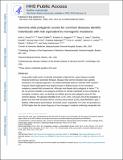Genome-wide polygenic scores for common diseases identify individuals with risk equivalent to monogenic mutations
Author(s)
Khera, Amit V.; Chaffin, Mark; Aragam, Krishna G.; Haas, Mary E.; Roselli, Carolina; Choi, Seung Hoan; Natarajan, Pradeep; Lander, Eric Steven; Lubitz, Steven A.; Ellinor, Patrick T.; Kathiresan, Sekar; ... Show more Show less
DownloadAccepted version (824.8Kb)
Terms of use
Metadata
Show full item recordAbstract
A key public health need is to identify individuals at high risk for a given disease to enable enhanced screening or preventive therapies. Because most common diseases have a genetic component, one important approach is to stratify individuals based on inherited DNA variation 1 . Proposed clinical applications have largely focused on finding carriers of rare monogenic mutations at several-fold increased risk. Although most disease risk is polygenic in nature 2–5 , it has not yet been possible to use polygenic predictors to identify individuals at risk comparable to monogenic mutations. Here, we develop and validate genome-wide polygenic scores for five common diseases. The approach identifies 8.0, 6.1, 3.5, 3.2, and 1.5% of the population at greater than threefold increased risk for coronary artery disease, atrial fibrillation, type 2 diabetes, inflammatory bowel disease, and breast cancer, respectively. For coronary artery disease, this prevalence is 20-fold higher than the carrier frequency of rare monogenic mutations conferring comparable risk 6 . We propose that it is time to contemplate the inclusion of polygenic risk prediction in clinical care, and discuss relevant issues.
Date issued
2018-08Department
Massachusetts Institute of Technology. Department of Biology; Broad Institute of MIT and HarvardJournal
Nature Genetics
Publisher
Springer Science and Business Media LLC
Citation
Khera, Amit V. et al. "Genome-wide polygenic scores for common diseases identify individuals with risk equivalent to monogenic mutations." Nature Genetics 50, 9 (August 2018): 1219-1224 © 2018 The Author(s)
Version: Author's final manuscript
ISSN
1061-4036
1546-1718